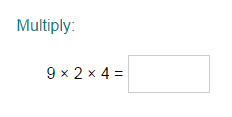- HOME
- QUIZZES
- MULTIPLICATION
- SOLVE USING PROPERTIES OF MULTIPLICATION
Solve using Properties of Multiplication
Using properties of multiplication, we can easily multiply a two-digit number with a one-digit number.
In order to do so, decompose one factor and multiply the other factor by its parts using distributive property.
According to the distributive property of multiplication,
a × (b + c) = ab + ac
Here, a, b, and c are any three numbers (not equal to zero).
For example: Let's find the product 16 × 6.
First decompose 16 as 16 = 10 + 6.
So, we have:
16 × 6 = (10 + 6) × 6
= (10 × 6) + (6 × 6) [using distributive property]
= 60 + 36 [using multiplication facts]
= 96
So, 16 × 6 = 96.
A B C D E F G H I J K L M N O P Q R S T U V W X Y Z
Help
The correct answer is
Remember :
The smallest number is the one that comes first while counting.
Solution :
To arrange the given numbers in order from smallest to greatest, find the smallest number among all the given numbers.
21,27,23
21 is the smallest number.



